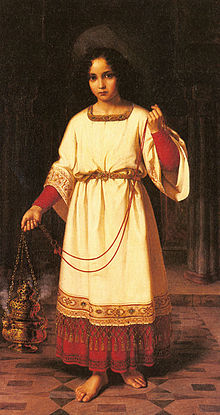Acolyte
The acolyte (from the Greek ἀκόλουθος akolouthos, «who follows» or «who accompanies») is a lay ministry of the Catholic Church, the Anglican Church and the Moravian Church, which allows the holder to assist the deacon by taking care of the service at the altar and assisting the priest during the liturgical celebrations, especially the mass.
History
Since the first centuries of the Church, it was customary to give the name acolytes to those young people who, aspiring to the ecclesiastical ministry, dedicated themselves to accompanying and following the bishops, both to serve them as pages, as to carry and bring the letters or epistles that were written to each other. In the past, they also collected the offerings of the faithful who were blessed during the mass and when it was finished they were delivered to the deacons and priests for distribution.
Some authors, including the learned Tomasino, maintain that the acolytes were never known in the Greek church. But others, with Fr. Goar, defend the opposite opinion supported by the testimony of Saint Dionysus, Saint Ignatius the martyr, of Saint Epiphanius, in the councils of Laodicea and Antioch, in Justinian's novels and on the authority of Photius, adding that the modern Greeks today have acolytes with the name of ceroferarios.
Everyone, however, agrees that the Latin church had them, as we have said, from the earliest times. In Rome three classes were known, viz.:
- palatinosserved the Pope in his palace
- stationary, they were attached to the service of some particular church
- regionThey followed and accompanied the subdeacons by helping them in the functions of their ministry that they exercised in the various barracks of the city.
In January 2022, Pope Francis conferred the ministry of lectors and acolytes to women for the first time.
Functions
The ministry of the acolyte is recognized by collation or institution by the bishop, although this ministry in practice is normally performed by "unofficial" acolytes, that is, not instituted. Candidates for the holy orders of the diaconate and presbyterate are normally instituted as acolytes, although the ministry can be exercised by lay persons (cleric status is received with the ordination of deacon).
According to the Code of Canon Law, baptized laymen may be instituted acolytes, although the exercise of this ministry does not entitle them to remuneration from the Catholic Church (cf. CDC 230). Its main specific functions are:
- Distribute communion when ministers are missing for some reason or when the number of communicators is too high.
- Also in special circumstances can expose and reserve the Blessed Sacrament but not give the Eucharistic blessing.
- Instruct altar altar altars and other people who help in the service of the altar.
According to the Code of Canon Law, candidates for the priesthood must be instituted acolytes at least six months prior to diaconal ordination.
The Extraordinary Minister of Holy Communion has functions equivalent to those of the acolyte.
Altar Servers
Although the term acolyte is also used to refer to those who help at the altar without having been instituted, the expressions "altar boy" or "servant of the altar" are more precise, to avoid confusion. It is usual for the ministry of the altar to be exercised by children, called in this case altar boys, with the only difference that they cannot give communion, due to their age. The fact that it is usual does not mean that it is a ministry for children, but that it can be exercised without an institution by any Christian who has received First Communion.
The word altar boy comes from little monks, in Italy they are known as chierichetti or little clergymen, in Catalan escolans and in Germany ministrantes. The word acolyte is preferred, reserving the word "altar boy" for extraordinary or de facto ministers, that is, they have not been solemnly appointed and do not belong to a "college" acolytes or who exercise these functions sporadically.
The altar servers are “de facto acolytes”, who without having been instituted in the ministry of acolytes, exercise it more or less permanently in community celebrations.
The functions that these altar servers can perform are:
- Attend the service of the altar.
- Help the bishop, the priest and the deacon.
- Serve your service in the various processions, for example with the cross, the cirians, the incense or the missal.
- Attend in the offer to the collection of gifts or offerings.
Contenido relacionado
Babel Tower
Teresa of Calcutta
Anthem

